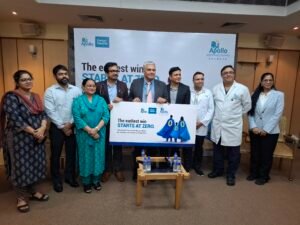Staff Reporter : Kolkata, 7th. June 2024. Brain tumours remain a significant concern in people’s mind and often covered in myths and misconceptions. As we observe World Brain Tumor Day, it is important to shed light on the advancements in understanding, diagnosing, treating these complex conditions and breaking the myths.
The most common brain tumours are metastatic in origin, they arise from cancers elsewhere in the body and then spread to the brain and spine. Hence, they are also known as a secondary brain tumour.
Tumours which arise primarily from the brain are called primary brain tumour. Primary brain tumours behave differently to tumours arising from other parts of the body. According to the World Health Organization (WHO), there are four grades of primary brain tumours. Grade I tumours grow very slowly, taking years to manifest. Grade II tumours are a bit more aggressive and may have originated from grade I tumours, manifesting within months. Grade IV tumours are the fastest and most aggressive tumours amongst the primary brain tumours. Generally, we consider the grade IV tumours as malignant primary brain tumours.
However, contrary to tumours in other parts of the body, even benign brain tumours might need surgical resection followed by chemotherapy or radiotherapy.
In the realm of brain tumours, busting myths is important. Contrary to popular belief, brain tumours are not always a death sentence. Through comprehensive treatment plans and a holistic approach, patients can return to normal life. It’s also vital to address misconceptions surrounding the causes of brain tumours, such as the usage of mobile phones leading to severe brain tumours. In the past, treating patients was difficult, and many would die with or without treatment. But now, the success rates are much higher. Even grade IV tumours can be successfully controlled now, with patient’s survival rates going up. Treatment and recovery from brain tumours depends upon early presentation, surgical intervention with minimal damage to the normal brain and also the location of the tumour in the brain (tumours in eloquent part of the brain are more difficult to resect and treat as opposed to tumours in non-eloquent parts of the brain).
Prevention plays a crucial part here. The importance of a healthy lifestyle and managing conditions like diabetes and hypertension can significantly enhance brain health as a whole. Prioritizing mental health and seeking appropriate treatment for conditions like depression is important. Additionally, engaging in mentally stimulating activities or games, like crossword puzzles and sudoku, which can improve brain health. Many patients have shown improvement through these exercises.
The problem with brain tumours is that they often go undiagnosed or present late. It is important to get investigations like MRI and CT scans to diagnose tumours in their early stages when there is any clinical suspicion of a brain tumour. Patients with brain tumours might present with early morning headaches, blurring of vision, nausea and vomiting, stroke like symptoms, seizures etc. Ultimately, a holistic approach is the key to fight against the complexities of brain tumours. In CMRI, we take multidisciplinary approach to treat patients suffering from brain tumours.
As we commemorate World Brain Tumour Day, let us not only raise awareness but also celebrate the progress made in the field of neurosurgery in the fight against brain tumours and increase the life span of people suffering from this condition.











Be First to Comment